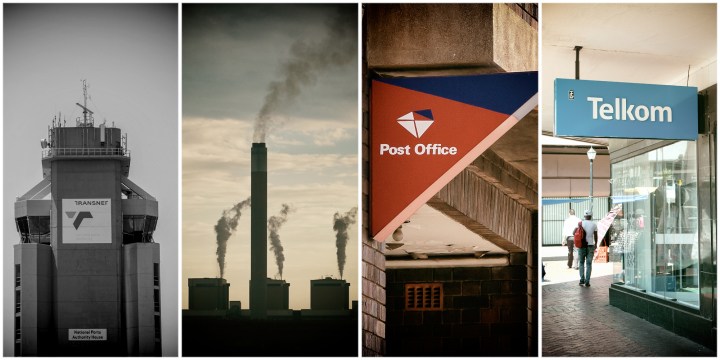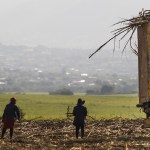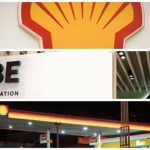BUSINESS REFLECTION
After the Bell: South African SOEs — one corporate ring to rule them all

Will putting all South Africa’s state-owned enterprises into a single pot make it boil? Or will this be another complicated reshuffling of the deckchairs on these ships that won’t keep them from sinking?
The government is considering restructuring its portfolio of state-owned enterprises (SOEs), and putting the major corporations into a single vehicle, taking its cue from the approach of other countries, particularly Singapore, China and Malaysia.
The essential thinking behind this idea is to try to reverse the massive flight of skills and human capital that has reduced a whole range of once-proud entities into dysfunctional, uncompetitive and degraded organisations. But will putting all the SOEs into a single pot make it boil? Or will this be another complicated reshuffling of the deckchairs on these ships that won’t keep them from sinking?
Internationally, state-owned enterprises had a moment in 2015 when people around the world started to realise how important the sector was. At that point, there were some 142 SOEs on Fortune magazine’s list of the top 500 companies, up from 64 a decade earlier. Revenue of these companies had increased from about $3.5-trillion to a little over $7-trillion during the same period.
It seemed, for a moment, that a new form of business might be emerging, one which might balance private interests with those of the populace in general, as represented by the state. By far the biggest contributor to this expansion was the Chinese government-owned companies, whose revenue constituted about 15% of the total revenue of those 142 companies. The revenue of all the other companies combined was more or less static over the period.
This was such a contrast with the 1990s and the early 2000s, when all the movement seemed to be in the opposite direction, and much of the European policy direction was the other way around, towards private rather than government ownership. The privatisation drive in Europe and particularly the UK was mirrored by increasing private sector inclusion into state-owned enterprises all over the developing world.
Since 2015, the situation has more or less plateaued. Today there are still about 141 SOEs on the Fortune 500. But the global enthusiasm for SOEs has waned, I would guess, although the previous enthusiasm for privatisation has not returned.
Over this period, movement on this front in South Africa was gelatinous. The Department of Public Enterprises, established in the 1990s by the departing apartheid government to sell down the assets, just got stuck in aspic. The only logic behind putting, for example, Transnet into a ministry separate from the transport ministry was that the government didn’t expect it to be part of the government for long. But nothing happened. For years. And the whole package exists to this day almost unchanged in the public enterprises ministry. There were some slight movements during the Mbeki administration: SAA got a private shareholder, as did the Airports Company of SA.
It seemed for a moment that SA might join the global community, but alas, the ANC’s left-wing stalwarts just couldn’t get their heads around the idea of partial private ownership, never mind full privatisation. You do slightly have to wonder where Eskom would be today if people like Alec Erwin and Blade Nzimande had not slammed the door on partial privatisation in late 2010. They have an enormous amount to answer for.
Bankruptcy
What has changed is that SA’s SOEs are now slowly, one by one, going bankrupt. The Post Office recently pocketed the money it deducts from its employees’ salaries for healthcare. It’s just gobsmacking. Cadre deployment has gutted the management of SOEs, corruption has destroyed the pride employees once had in working for the development of their country, and government oversight has been abysmal.
My favourite story about SOEs was when one of my former colleagues went to a press briefing given by the CEO of Prasa. In front of the press, the CEO had to be told directions to the boardroom. Apparently, being CEO does not require actually coming into the office — ever.
Anyway, so now it’s time for emergency action, and why not follow the example of the most successful players in this field, right? But what I suspect is the government might not understand what this actually entails.
Take China, for example: China does have a single institution that holds stakes in SOEs. It’s called the State-owned Assets Supervision and Administration Commission of the State Council. Just rolls off your tongue. It controls or owns stakes in about 95 of the biggest SOEs in China. But outside of the companies that are directly linked to state security, its policy has been to get these companies largely into private hands.
A good example is the Aluminum Corporation of China, which is the largest aluminium company in the world by a country mile. China produces enormous amounts of aluminium, about 10 times more than any other country. And the Aluminum Corporation is the biggest in its portfolio.
But significantly, it’s not a monopoly player — there are two other huge aluminium companies, Yunnan Aluminium and Tianshan Aluminum, in the Chinese market, and plenty of other lesser ones. Not only that, but the assets administration only owns about 40% of Aluminum Corp, and the company is listed in the US and Hong Kong.
In listing the companies, the administration effectively embraced not only private sector culture, but private sector performance expectations and a whole new regulatory framework. But, for the Aluminum Corporation, it’s been an extraordinary run: margins are tight, but what was a $17-billion turnover in 2010 now stands at $40-billion.
So the nominally communist country’s policy is essentially to push its state-owned companies out of public ownership, to list on a stock exchange, and to compete in a competitive market. What do you think a nominally capitalist country would do? Completely the opposite, obviously.
Singapore’s equivalent of the Chinese assets administration is Temasek Holdings, which is entirely state-owned and controlled by the finance minister, but it does have its own board. Unlike the piddly 95 companies controlled by the Chinese assets administration, it has about 1,700 investments, and just under $500-billion in assets under management.
Temasek might have started as a state corporation designed to help close gaps in the market, but now it’s a full-on private equity/investment house. However, it shares one common feature with the Chinese Assets Administration: a large proportion of its holdings are in listed investments, in which it is a shareholder, sometimes large and sometimes small. It’s a 56% shareholder, for example, in Singapore Airlines.
So the question for the SA government is really not so much about the structure, but whether they, and the ANC, have got their heads around the idea of being shareholders rather than controllers. That question is key, and frankly, my suspicion is that they haven’t — and if they haven’t, then I’m afraid, this effort will be just another shifting-the-deckchairs operation. DM

















I have had the dubious pleasure of sitting in on meetings with a number of ‘advisors’ to government on industrial policy in the last few years and they are all, without fail, unreconstructed socialists who haven’t moved ideologically since the 1970s, despite the world being an unrecognisably different place: there is no accounting for globalisation, for advances in technology, for new industries and the opportunities they bring, just a grim determination to fit square pegs into round holes, all the while glaring at business for showing up their abject failure. Everything they recommend is tightly controlled by regulations that stifle anything like growth and all because they live in a world of suspicion and ideology, with zero ability to think with agility or clarity.
Well said! Control for access to the levers of enrichment and blinkered Socialist naiveté are at the root of the state of SA.
Exactly right!
I believe that SOEs are appropriate under certain, limited circumstances. Natural monopolies are one such case. However, changing technologies can alter the nature of an industry or sector (by reducing the barriers to entry, for example). SOEs may need to be (semi-)privatised in such cases, with competition introduced simultaneously.
One glaring example in South Africa is electricity generation (and, in its infancy, storage).